2006 United States House of Representatives elections in Arizona
The 2006 congressional elections in Arizona were elections for Arizona's delegation to the United States House of Representatives, which occurred along with congressional elections nationwide on November 7, 2006. Arizona has eight seats, as apportioned during the 2000 United States Census. Prior to the election, Republicans held six of the eight seats and Democrats held two. In the 8th district, Republican Congressman Jim Kolbe retired, leaving an open seat. Following the elections, Democrats gained two seats at the expense of the Republicans, who lost two.
| |||||||||||||||||||||||||||||||||
All 8 Arizona seats to the United States House of Representatives | |||||||||||||||||||||||||||||||||
|---|---|---|---|---|---|---|---|---|---|---|---|---|---|---|---|---|---|---|---|---|---|---|---|---|---|---|---|---|---|---|---|---|---|
| |||||||||||||||||||||||||||||||||
| Elections in Arizona |
|---|
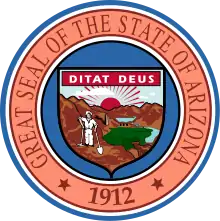 |
Overview
| United States House of Representatives elections in Arizona, 2006[1] | |||||
|---|---|---|---|---|---|
| Party | Votes | Percentage | Seats | +/– | |
| Republican | 771,246 | 51.65% | 4 | -2 | |
| Democratic | 627,259 | 42.01% | 4 | +2 | |
| Libertarian | 90,214 | 6.04% | 0 | - | |
| Independents | 4,431 | 0.30% | 0 | - | |
| Totals | 1,493,150 | 100.00% | 8 | - | |
District 1
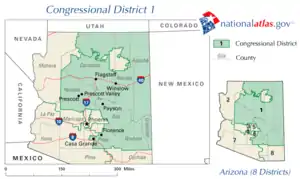
This normally conservative district, based in the region north of Phoenix and Tucson and one of the largest districts in the country, was represented by Republican Congressman Rick Renzi since his initial election in 2002. Renzi faced ethical problems in this election and was named by Citizens for Responsibility and Ethics in Washington as one of the most corrupt candidates running for office that year.[2] Attorney and community activist Ellen Simon emerged as the Democratic nominee and, though she trailed Renzi by wide margins, initially, made up much of the lost ground and closed the gap, causing many to consider the race competitive. Ultimately, though, Renzi won re-election by an eight-point margin.
| Party | Candidate | Votes | % | |
|---|---|---|---|---|
| Republican | Rick Renzi (incumbent) | 105,646 | 51.75 | |
| Democratic | Ellen Simon | 88,691 | 43.45 | |
| Libertarian | David Schlosser | 9,802 | 4.80 | |
| Total votes | 204,139 | 100.00 | ||
| Republican hold | ||||
District 2
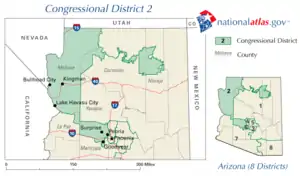
This heavily conservative and gerrymandered congressional district owes its strange shape to the decision to not have Hopi and Navajo Native Americans represented by the same congressman due to historic tensions between them. Republican Congressman Trent Franks has represented this district since his initial election in 2002 and has managed comfortable re-elections due to the conservative nature of the Phoenix suburbs that the district pulls from. This year proved to be no different, when Congressman Franks defeated Democratic challenger John Thrasher, albeit by a smaller margin than usual.
| Party | Candidate | Votes | % | |
|---|---|---|---|---|
| Republican | Trent Franks (incumbent) | 135,150 | 58.62 | |
| Democratic | John Thrasher | 89,671 | 38.89 | |
| Libertarian | Powell Gammill | 5,734 | 2.49 | |
| Write-ins | 5 | 0.00 | ||
| Total votes | 230,560 | 100.00 | ||
| Republican hold | ||||
District 3

This staunchly conservative district, based in the northern portion of Phoenix and its northern suburbs, has been represented by incumbent Republican Congressman John Shadegg since his initial election in 1994. This year, Congressman Shadegg faced Democratic nominee Herb Paine, a consultant, in the general election. True to the district’s conservative nature, Shadegg defeated Paine by a wide margin, though it was significantly reduced from his 2004 re-election.
| Party | Candidate | Votes | % | |
|---|---|---|---|---|
| Republican | John Shadegg (incumbent) | 112,519 | 59.27 | |
| Democratic | Herb Paine | 72,586 | 38.23 | |
| Libertarian | Mark Yannone | 4,744 | 2.50 | |
| Total votes | 189,849 | 100.00 | ||
| Republican hold | ||||
District 4

This heavily liberal district, based in the southern portion of Phoenix and its southern suburbs, has a high Hispanic-American population. Incumbent Democratic Congressman Ed Pastor has represented this portion of the state since a special election in 1991 to replace the late Mo Udall. In 2006, Congressman Pastor faced Don Karg, the Republican nominee and an aerospace executive, and Donald Harders, the Libertarian write-in candidate.
| Party | Candidate | Votes | % | |
|---|---|---|---|---|
| Democratic | Ed Pastor (incumbent) | 56,464 | 72.52 | |
| Republican | Don Karg | 18,627 | 23.92 | |
| Libertarian | Ronald Harders | 2,770 | 3.56 | |
| Total votes | 77,861 | 100.00 | ||
| Democratic hold | ||||
District 5

This conservative-leaning district includes a small portion of Phoenix and many of its northeastern suburbs, such as Scottsdale and Tempe. Congressman J. D. Hayworth has represented this area since his initial election in 1994 and many considered him to be vulnerable to a Democratic challenger. Harry Mitchell, a former Mayor of Tempe, State Senator, and Chairman of the Democratic Party of Arizona, emerged as the Democrats’ leading challenger to Hayworth. Though the race was close for much of the fall, Mitchell ultimately edged out Hayworth on election day by a four-point margin and was elected to his first term in Congress.
| Party | Candidate | Votes | % | |||
|---|---|---|---|---|---|---|
| Democratic | Harry Mitchell | 101,838 | 50.41 | |||
| Republican | J. D. Hayworth (incumbent) | 93,815 | 46.44 | |||
| Libertarian | Warren Severin | 6,357 | 3.15 | |||
| Total votes | 202,010 | 100.00 | ||||
| Democratic gain from Republican | ||||||
District 6
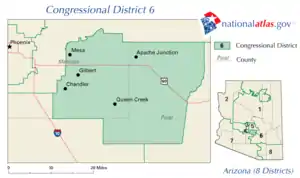
This heavily conservative district based in the eastern suburbs of Phoenix has been represented by Republican Congressman Jeff Flake since his initial election in 2000. Congressman Flake built up a repertoire in Congress as being a staunch fiscal conservative and an anti-earmark advocate. This year, Flake faced no Democratic opponent and was overwhelmingly re-elected to his fourth term in Congress over Libertarian candidate Jason Blair.
| Party | Candidate | Votes | % | |
|---|---|---|---|---|
| Republican | Jeff Flake (incumbent) | 152,201 | 74.80 | |
| Libertarian | Jason M. Blair | 51,285 | 25.20 | |
| Total votes | 203,486 | 100.00 | ||
| Republican hold | ||||
District 7

This district, based in southwestern Arizona and covering much of the state’s border with Mexico, has a majority Hispanic-American population and has been represented by Democratic Congressman Raúl Grijalva since 2003. This year, Congressman Grijalva faced the former Mayor of Avondale, Republican Ron Drake, and Libertarian write-in candidate Joe Cobb. Grijalva defeated both Drake and Cobb, as expected, by a comfortable margin.
| Party | Candidate | Votes | % | |
|---|---|---|---|---|
| Democratic | Raúl Grijalva (incumbent) | 80,354 | 61.09 | |
| Republican | Ron Drake | 46,498 | 35.35 | |
| Libertarian | Joe Cobb | 4,673 | 3.55 | |
| Total votes | 131,525 | 100.00 | ||
| Democratic hold | ||||
District 8
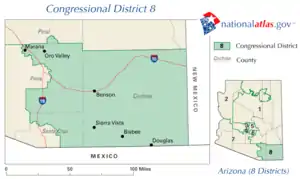
Long-serving Republican Congressman Jim Kolbe, a respected moderate and an openly gay man, declined to seek a seventh term in Congress and thus created an open seat. This marginally conservative district based in southeastern Arizona narrowly supported George W. Bush in 2000 and 2004 and the election was considered to be competitive. Former State Representative Randy Graf, a far-right conservative who had challenged Kolbe in the Republican primary in 2004, and former State Senator Gabrielle Giffords, a moderate Democrat, faced off against each other in the general election. Giffords was the tentative favorite for most of the election, as many moderates were turned off by Graf’s conservative views and Kolbe did not endorse him as the Republican candidate. On election day, Giffords emerged victorious over Graf by a comfortable twelve-point margin and won her first term in Congress.
| Party | Candidate | Votes | % | |||
|---|---|---|---|---|---|---|
| Democratic | Gabrielle Giffords | 137,655 | 54.25 | |||
| Republican | Randy Graf | 106,790 | 42.09 | |||
| Libertarian | David F. Nolan | 4,849 | 1.91 | |||
| Independent | Jay Quick | 4,408 | 1.74 | |||
| Write-ins | 18 | 0.01 | ||||
| Total votes | 253,720 | 100.00 | ||||
| Democratic gain from Republican | ||||||
References
- http://clerk.house.gov/member_info/electionInfo/2006/2006Stat.htm#3
- "Archived copy". Archived from the original on 2011-08-10. Retrieved 2011-06-16.CS1 maint: archived copy as title (link)